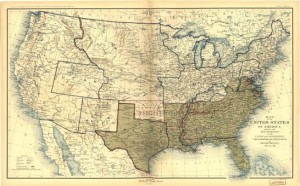 Privately determined to free the South’s African slaves, U.S President Abraham Lincoln today ratchets up Northern military might while maintaining a cautious public profile regarding slavery. The Union Army receives a boost from the president’s order to draft 300,000 militia for a period of nine months. It is doubtful that Lincoln believes he will need the service of the recruits for a mere nine months, but there is enough public dissatisfaction with the war that a short term stance is more prudent.
Privately determined to free the South’s African slaves, U.S President Abraham Lincoln today ratchets up Northern military might while maintaining a cautious public profile regarding slavery. The Union Army receives a boost from the president’s order to draft 300,000 militia for a period of nine months. It is doubtful that Lincoln believes he will need the service of the recruits for a mere nine months, but there is enough public dissatisfaction with the war that a short term stance is more prudent.
In another cautious move, Lincoln declines the offer of a delegation of Western men (including two congressmen) to supply two Indiana Negro regiments to the U.S. Army. The New York Tribune summarizes Lincoln’s rationale:
Upon the policy of using negroes as laborers, the confiscation of Rebel property, and the feeding the National troops upon the granaries of the enemy, the President said there was no division of sentiment. He did not explain, however, why it is that the Army of the Potomac and the Army of Virginia carry out this policy so differently. The President promised that the war should be prosecuted with all the rigor he could command, but he could not promise to arm slaves or to attempt slave insurrections in the Rebel States. The recent enactments of Congress on emancipation and confiscation he expects to carry out.
The war is wearing upon the president, and as he had been taught when growing up in a Baptist church, he repeatedly turns to God. In addition to his actions of this day, Lincoln pens the following in a letter:
I can only say that I have acted upon my best convictions without selfishness or malice, and that by the help of God, I shall continue to do so.
Meanwhile, the United States occupation of portions of Virginia continues. Today in occupied Isle of Wight County, the Richmond Daily Dispatch reports that ” The Rev. Putnam Owens of the Baptist church, was arrested last Sunday at Windsor, Isle of Wight.” Owens is one of many Baptist ministers arrested in Union occupied portions of Virginia and Tennessee during the war, typically for the crime of refusing to pledge an oath to the United States. A Virginia Baptist minister prior to, during and after the war, Owens is well known locally.
During his whole ministry he baptized more than 1,522 persons. He was a prominent and influential member of the Portsmouth Association, and he often attended the General Association, but his modesty prevented his worth from being widely known beyond the bounds of his own field Of irreproachable and lovely character, firm in his adherence to the truth, scriptural in his preaching, he increased in power and usefulness to the end of his life. His death took place at the home of Dr. Kelso, after an illness of ten days, May 10, 1877.
Faith is inextricably intertwined with the war, as this day and every other day of the conflict reveals in ways both prominent and private, both North and South.
Sources: The Lincoln Log, August 4, 1862 (link); “Remarks to Deputation of Western Delegation,” New York Tribune, August 5, 1862 (link); Richmond Daily Dispatch, August 4, 1862 (link); George B. Taylor, Virginia Baptist Ministers, Third Series, Lynchburg: J. P. Bell, 1912, p. 264 (link)


